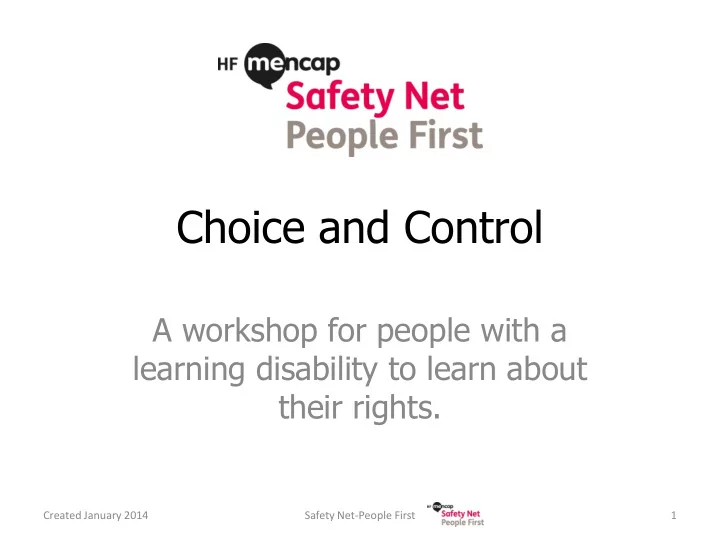

Choice and Control A workshop for people with a learning disability to learn about their rights. Created January 2014 Safety Net-People First 1
Choice and Control • This booklet is for you to keep. • There is a lot of important information in here. • You can look at it when you need to speak up for yourself. Created January 2014 Created January 2014 Safety Net-People First Safety Net-People First 2 2
Jargon words Mental Capacity Act – this is the name • of a law. Mental Capacity means how much a • person can understand. When someone says “he has mental capacity” it means that he can understand well enough to make a decision. 5 key principles – these are the • important things to know about the Mental Capacity Act. Created January 2014 Safety Net-People First 3
Jargon words Decisions – this is when you make a • choice between 2 or more options. Unwise – this is when something could • be wrong or bad. In your Best Interest – this means that • something is right and good for your life. Right to freedom – this means that you • can’t be made to do anything by anyone else. Created January 2014 Safety Net-People First 4
Choice and Control • The law in this booklet is for everyone. • The law is to make sure that people are safe. • It is important to use the law properly. Created January 2014 Safety Net-People First 5
Your Rights The government created a law in 2005. • It is called the Mental Capacity Act . • There are 5 key principles . • You need to know about these because • they affect you. Created January 2014 Safety Net-People First 6
5 key principles A person should make their own decisions unless • it can be shown that they need support. A person should be given as much support as • possible to make their own decision. A person is allowed to make an unwise decision. • When a person can’t make their own decision • about something, other people must act in his/her best interest. Every decision made must respect the person’s • right to freedom . Created January 2014 Safety Net-People First 7
5 key principles – number 1 A person should make their own decisions unless it can be shown that they need support . What this means for you: The law says that you should make your own decisions. Other people might think that you lack capacity. This means they think that you don’t understand something well enough to make a decision about it. The law says that they need to talk to you to check how much you understand. This is called an assessment. Created January 2014 Safety Net-People First 8
5 key principles – number 2 A person should be given as much support as possible to make their own decision. This might mean: giving you extra time to think about it, • showing you with pictures, • using other ways to communicate, • supporting you at the best time of day, • with someone who knows you, • In a place that you feel comfortable. • Created January 2014 Safety Net-People First 9
5 key principles – number 3 A person is allowed to make an unwise decision. What this means for you: You can choose from the same options as everyone else. You are allowed to do things that other people think are wrong if you think they are right for you. Someone might think you could come to harm or it would be foolish to make the choice you want. You might need support to understand why it could be an unwise decision. But, if you have capacity, the law says that you can choose what you want. Created January 2014 Safety Net-People First 10
5 key principles – number 4 When a person can’t make their own decision about something, other people must act in his/her best interest. What this means for you: If you are very sick or you don’t understand something, other people can make a decision for you. They will have a meeting to talk about you and the decision. People who might be there are family, close friends, carers, and social workers. You should be there too if you want. Ask for an advocate if you want support to speak up. Created January 2014 Safety Net-People First 11
5 key principles – number 5 Every decision made must respect the person’s right to freedom. What this means for you: The decision other people make for you must not take away too much of your freedom. People are not allowed to tie you up, lock your doors, or stop you doing things, except if they really need to. If they really need to take away some of your freedom, they must do lots of paperwork and tell you and other people who care about you why they are doing it. Created January 2014 Safety Net-People First 12
Your Rights You will only lack capacity for one decision • at a time. You should still make all your own • decisions and still get support when you need it. You might need to have another • assessment about a different decision. After a decision is made in your best • interest it can be changed if it doesn’t work well for you. Created January 2014 Safety Net-People First 13
Thank you Please keep this booklet so you know your rights. Kate.buchan@HFmencap.org www.HFmencap.org Created January 2014 Safety Net-People First 14
Recommend
More recommend